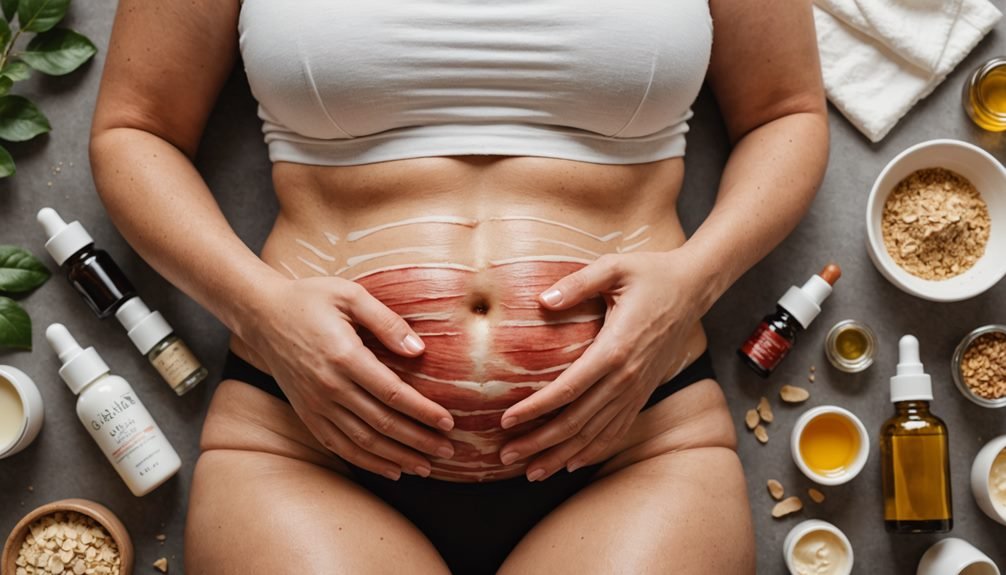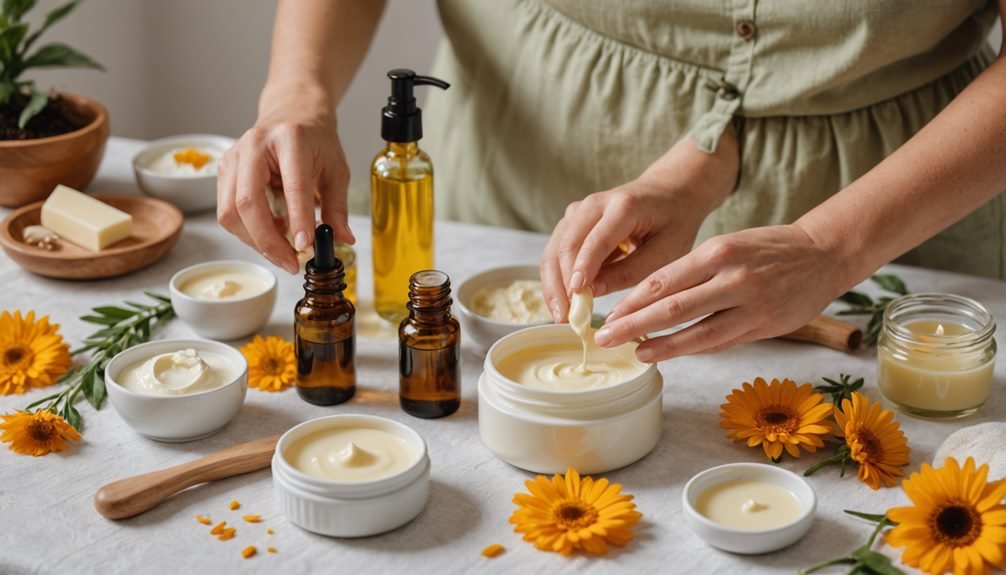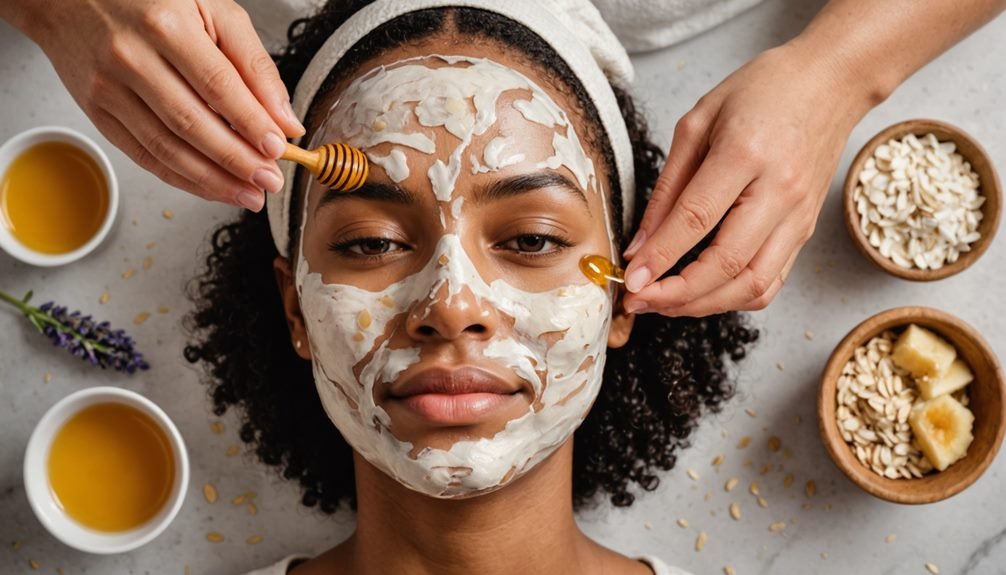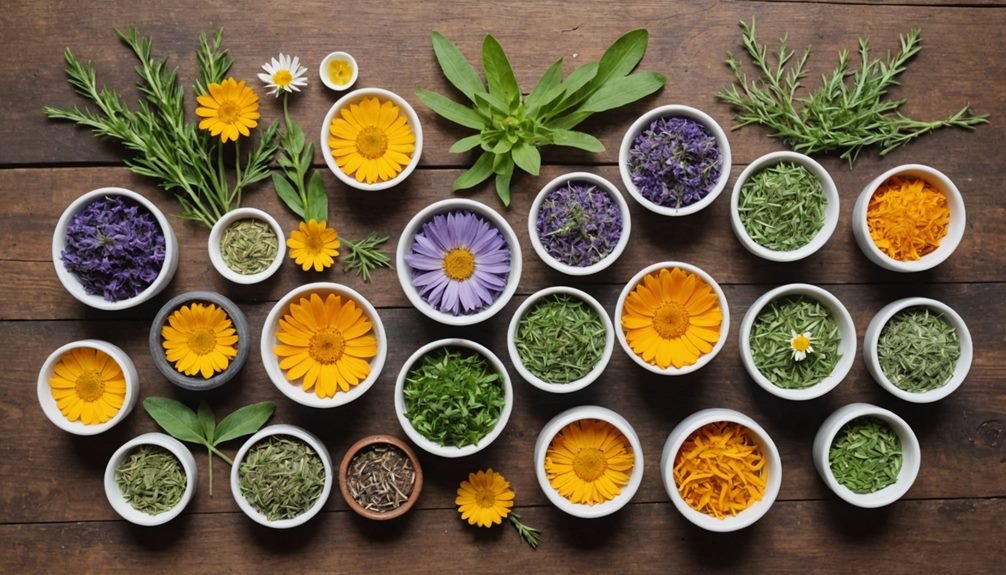"Cherishing Little Steps - A Haven for Baby and Family Journeys"
Healing Postpartum Skin Naturally
Imagine your skin postpartum as a delicate flower that needs gentle care and nourishment to bloom again. From the moment your little one arrives, your focus shifts, and amidst the chaos, your skin may yearn for some extra love. But fear not, there are natural ways to replenish and rejuvenate your skin, allowing it to thrive once more. By exploring the healing powers of nature and incorporating simple yet effective practices, you can embark on a journey towards restoring your postpartum skin's vitality and glow.
Understanding Postpartum Skin Changes

Understanding postpartum skin changes is crucial for new mothers as they navigate the journey of motherhood. Hormonal fluctuations during pregnancy and after childbirth can lead to a variety of skin issues, including increased skin sensitivity. These changes can impact collagen production, which plays a vital role in maintaining skin elasticity.
As hormonal levels shift postpartum, some women may experience dryness, acne breakouts, or pigmentation changes. The skin may also feel more sensitive to environmental factors and skincare products.
It is essential to be mindful of these changes and adapt your skincare routine accordingly. Opt for gentle, nourishing products that can help support collagen production and maintain skin elasticity. Consider incorporating ingredients like hyaluronic acid, vitamin C, and antioxidants into your skincare regimen to promote skin health and vitality.
Stay hydrated, eat a balanced diet rich in nutrients, and prioritize self-care to support your skin from within. By understanding these postpartum skin changes and taking proactive steps to care for your skin, you can embrace the journey of motherhood with confidence and glowing skin.
Nourishing Your Skin From Within
To nourish your skin from within, prioritize a well-rounded diet rich in essential nutrients and hydration. Consuming a nutrient-rich diet plays a crucial role in supporting your skin's health postpartum.
Include plenty of fruits and vegetables for vitamins A, C, and E, which help in skin repair and protection. Omega-3 fatty acids found in fish, flaxseeds, and walnuts can aid in maintaining skin elasticity. Additionally, zinc from sources like nuts, seeds, and whole grains promotes wound healing and collagen production.
Internal hydration is equally important for skin health. Drinking an adequate amount of water each day helps flush out toxins, keeping your skin clear and hydrated. Herbal teas and coconut water are also great options to boost internal hydration levels.
Gentle Skincare Routine Tips

For a gentle skincare routine postpartum, it's essential to prioritize products that are soothing and non-irritating to your sensitive skin. To soothe inflammation and calm sensitivity, opt for gentle cleansers that are fragrance-free and specifically formulated for sensitive skin. Look for ingredients like aloe vera, chamomile, and oat extract, known for their calming properties.
When choosing a moisturizer, select a hydrating cream or lotion that's free of harsh chemicals and artificial fragrances. Products with ceramides can help restore the skin barrier, reducing sensitivity and inflammation. Remember to patch test new products before applying them to larger areas of your skin to ensure they don't cause any adverse reactions.
Keep your skincare routine simple and consistent, avoiding harsh exfoliants and aggressive treatments that can further irritate your skin. Prioritizing gentle, soothing products will help nurture and protect your postpartum skin effectively.
Harnessing the Power of Essential Oils
Harnessing the Power of Essential Oils can be a beneficial way to address various postpartum skin concerns. Aromatherapy benefits from essential oils can help promote relaxation and reduce stress, which are common during the postpartum period.
When using essential oils for skincare, it's important to dilute them properly with a carrier oil to avoid any skin irritation. Some popular essential oils for postpartum skincare include lavender, chamomile, and rosehip oil, known for their soothing and nourishing properties.
Topical application techniques are crucial when using essential oils on the skin. It's recommended to perform a patch test before using any new essential oil to ensure you don't have an allergic reaction. Mixing a few drops of essential oil with a carrier oil, such as coconut or almond oil, can help enhance absorption and reduce the risk of skin sensitivity.
Gently massage the oil mixture onto clean, dry skin in circular motions to promote better absorption and relaxation. By incorporating essential oils into your postpartum skincare routine, you can enjoy the benefits of aromatherapy while addressing your skin concerns naturally.
DIY Natural Remedies for Skin

Exploring natural remedies for postpartum skin can offer a gentle and effective approach to nurturing your skin during this delicate period. Herbal remedies and DIY skincare can be powerful allies in rejuvenating your skin naturally.
A soothing herbal face steam using chamomile or calendula can help cleanse and hydrate your skin, promoting a healthy glow. DIY face masks with ingredients like honey, yogurt, and oats can provide nourishment and moisture, addressing common postpartum skin concerns such as dryness and dullness.
For gentle exfoliation, a homemade scrub using sugar or ground coffee can help slough off dead skin cells, revealing smoother and brighter skin underneath. Herbal teas like nettle or red raspberry leaf can be beneficial when consumed or used topically for their skin-loving properties.
Balancing Hormones for Radiant Skin
Achieving radiant skin postpartum is closely linked to balancing your hormones effectively. Hormonal imbalance postpartum can lead to various skin issues such as acne, dryness, or excessive oiliness. Balancing your hormones is crucial for skin rejuvenation and overall well-being during this period.
To balance your hormones naturally, focus on a healthy diet rich in fruits, vegetables, whole grains, and lean proteins. Incorporate foods high in omega-3 fatty acids like salmon and flaxseeds to support hormone production. Regular exercise can also help regulate hormones and reduce stress levels, which can contribute to hormonal imbalances.
Furthermore, getting an adequate amount of sleep is essential for hormone balance and skin health. Lack of sleep can disrupt hormone production, leading to skin issues. Prioritize self-care activities that promote relaxation and stress reduction.
Consulting with a healthcare provider or a dermatologist can also provide valuable insights into balancing hormones and achieving radiant postpartum skin. By addressing hormonal imbalances through lifestyle changes and self-care, you can promote skin rejuvenation and enhance your overall well-being.
Alleviating Stretch Marks Naturally

To naturally alleviate stretch marks postpartum, it is essential to understand that these marks are a common occurrence due to the stretching of the skin during pregnancy. While they may fade over time, there are ways to help improve their appearance and promote skin elasticity. Consider incorporating the following stretch mark solutions and skin elasticity techniques into your postpartum skincare routine:
| Stretch Mark Solutions | Skin Elasticity Techniques |
|---|---|
| Hydration – Drink plenty of water to keep your skin hydrated and maintain its elasticity. | Massage – Gently massaging the affected areas can improve blood flow and promote healing. |
| Vitamin E – Apply vitamin E oil to nourish the skin and potentially reduce the visibility of stretch marks. | Exercise – Regular physical activity can help tone the skin and improve its overall elasticity. |
| Aloe Vera – Aloe vera gel has soothing properties that may aid in minimizing the appearance of stretch marks. | Healthy Diet – Eating foods rich in vitamins A, C, and E can support skin health and elasticity. |
| Cocoa Butter – Cocoa butter is known for its moisturizing properties and can be beneficial in hydrating the skin. | Collagen-Boosting Ingredients – Look for skincare products containing collagen-boosting ingredients like peptides or retinol. |
| Exfoliation – Gentle exfoliation can help remove dead skin cells and promote the regeneration of new, healthy skin. | Stay Sun Safe – Protect your skin from UV damage by using sunscreen to maintain its elasticity. |
Hydration and Skin Health
Understanding the crucial role that hydration plays in maintaining skin health postpartum is essential for promoting overall well-being. Your skin barrier, which shields you from external threats, relies on adequate moisture balance to function optimally.
During the postpartum period, hormonal changes can impact your skin's hydration levels, potentially leading to dryness or irritation. By prioritizing hydration, you can support your skin barrier and enhance its ability to protect against environmental stressors.
Ensuring sufficient water intake is a fundamental step in maintaining your skin's moisture balance. Additionally, incorporating hydrating skincare products can help replenish lost moisture and fortify the skin barrier.
Look for products containing ingredients like hyaluronic acid and glycerin, known for their ability to attract and retain moisture. By nurturing your skin with proper hydration, you can promote its health and resilience postpartum, aiding in the restoration of a vibrant and glowing complexion.
Healing Herbs for Postpartum Skin

In your journey to nurture and heal your postpartum skin, exploring the benefits of incorporating healing herbs can offer a natural and gentle approach. Herbal remedies have long been known for their skin-healing properties, making them a valuable addition to your postpartum skincare routine.
Calendula, known for its anti-inflammatory and soothing effects, can help with skin irritation and promote healing. Another beneficial herb is chamomile, which possesses calming properties and aids in reducing redness and irritation. Lavender, with its antiseptic and anti-inflammatory properties, can also assist in soothing and healing the skin postpartum.
These natural ingredients can be incorporated into your skincare routine through herbal-infused oils, balms, or even homemade face masks. By harnessing the power of these healing herbs, you can provide your postpartum skin with the care and nourishment it needs to recover and thrive.
Self-Care Practices for Skin Recovery
Considering the natural process of skin recovery postpartum, implementing self-care practices can play a vital role in supporting your skin's healing journey.
Mindful relaxation is crucial during this time as stress can negatively impact skin health. Engaging in activities like deep breathing, meditation, or gentle yoga can help reduce stress levels and promote overall well-being, which in turn can aid in skin recovery.
In addition to mindful relaxation, maintaining a healthy diet is essential for skin recovery postpartum. Consuming foods rich in vitamins, minerals, and antioxidants can provide your skin with the necessary nutrients to heal and regenerate. Incorporating fruits, vegetables, whole grains, lean proteins, and healthy fats into your diet can support collagen production, skin elasticity, and overall skin health.
Frequently Asked Questions
Can Postpartum Skin Changes Affect My Hair Growth?
Postpartum skin changes can indeed affect hair growth due to hormonal shifts. These fluctuations may lead to hair loss, impacting scalp health postpartum. It's essential to focus on nurturing your skin and hair during this period.
Consider consulting with a healthcare provider or dermatologist for personalized advice on managing these changes. Remember, taking care of your overall well-being can positively influence your hair growth journey.
How Long Should I Wait Before Using Essential Oils Postpartum?
You should wait at least six weeks postpartum before using essential oils. Essential oil safety is crucial during this time as your body is still in the process of skin barrier recovery. Introducing essential oils too soon can potentially disrupt this process and lead to skin irritation.
It's best to consult with your healthcare provider before incorporating essential oils into your postpartum skincare routine to ensure they align with your recovery timeline.
Are There Specific Foods to Avoid for Postpartum Skin Health?
Avoiding certain foods can benefit postpartum skin health. Dairy can impact skin due to hormones and inflammation. Gluten can have effects on skin conditions like eczema. Opt for anti-inflammatory foods such as berries and fatty fish. Incorporating more fruits and vegetables can provide essential vitamins and antioxidants for skin repair. Consider consulting a healthcare provider for personalized dietary recommendations to support your postpartum skin health journey.
Can Hormonal Changes Postpartum Lead to Skin Sensitivity?
Hormonal changes postpartum can indeed lead to skin sensitivity. Your skincare routines should focus on maintaining your skin's health and supporting hormonal balance. Using gentle, hydrating products can help soothe any sensitivity.
Ensure you stay hydrated and eat a balanced diet to support your skin from the inside out. If you notice persistent skin issues, consulting with a dermatologist can provide personalized recommendations for your postpartum skin concerns.
Is It Safe to Use DIY Remedies While Breastfeeding?
When it comes to DIY remedies while breastfeeding, you should exercise caution. Some herbal teas and skin care routines may not be safe for nursing moms. Always consult with your healthcare provider before trying any new remedies. They can offer guidance on what's safe and what to avoid. Your baby's health is a top priority, so it's best to err on the side of caution when it comes to using DIY remedies while breastfeeding.
Conclusion
As you embrace natural healing for your postpartum skin, envision yourself blooming like a delicate flower in the warm embrace of the sun. By nourishing your skin from within, adopting a gentle skincare routine, and incorporating healing herbs and essential oils, you are on the path to radiance and rejuvenation. Remember, just as a flower needs care and nourishment to flourish, your skin too deserves the gentle touch of nature's healing embrace.




